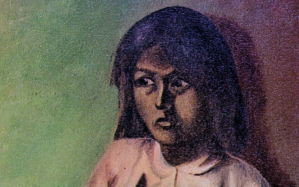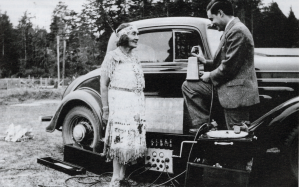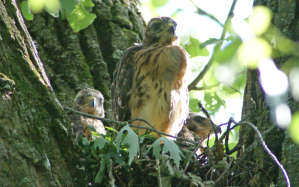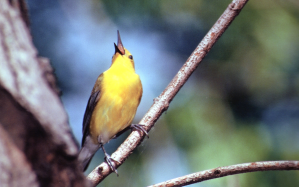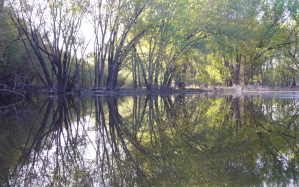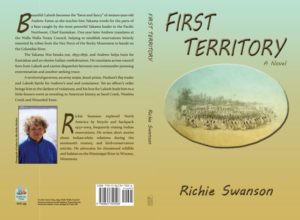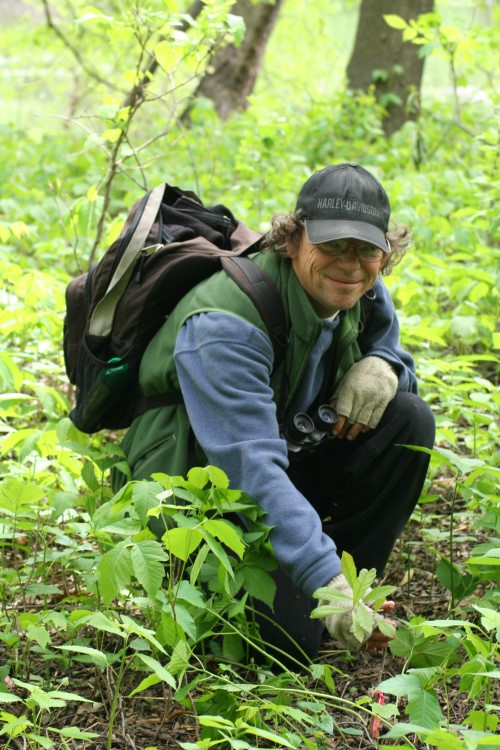(Copyright 2012 by Richie Swanson)
Poydras Review Winter 2012
Keekwillie played behind a hanging mat, smelling camas cooking in sweet grass, the hunt in his head so real he didn’t hear the rain against the cedar-plank roof or the bustle outside. He pretended he was a spruce cone in the little canoe his second mother Na’ah Lang had carved him, and he threw a feather-harpoon at a seal rolling in waves, a periwinkle spiraling gray, and his line caught tight, and the seal took him strong, lunging through breakers, splashing his face. The seal pulled the dugout through the mouth of Seal River, and it smashed through fish weirs, racing past Seal Village, and then it climbed through gorge-thunder, and it dove beneath rapids, and Keekwillie held on, going under, and the seal shouted in a man-voice, “Hu-hu-hu-hu-hu-hu-hu!”
The dugout came up beneath a far-off snow peak, and a monster hallooed in the woods, bones crunching, children yelling, and Keekwillie jumped out, grabbing his whalebone club, and then the door of the lodge swung open. Feet thudded down the notched plank, and Keekwillie stopped playing, gaping from his bunk. His father Saghilli was inside, and he spoke grave to Keekwillie’s first mother Kwahalips, “Boston men rafted across the river. They swam their horses.”
Elijah Wardwright stepped backward down the plank, turning thick-chinned above the fire, rain pouring off a drooping hat-brim, his face white and hard and grooved like a barnacle, his eyes a deep-dark mussel-blue bugging out like an elk’s caught in the river about to be clubbed. He spoke trade language sharp, calling himself the new Indian boss of the Oregon country, and Kwahalips turned and stared into her cooking pit, keeping his gaze out of her swollen belly, her baby beautiful, and then five soldiers in mussel-colored coats came down, and she climbed out quick.
Na’ah Lang tossed seal fat on the fire, brightening the house, and near’ everyone–Keekwillie’s brother Notowah, his uncles and half-brothers, the mussel coats, Saghilli and Wardwright–sat on dining mats, eating strings of dried clams, dried salmon, seaweed cakes in oolichan oil, myrtle nuts and acorns and roe.
Keekwillie’s sister Amotish brought in a basket of summer berries from a storage pool of the creek, and Wardwright laid a broadcloth coat in front of Saghilli and gave him a steel-bladed spade, a steel ax, wool blankets, shirts and breeches, a black-iron kettle and tobacco and then three coins shiny as the sun.
“What I want with that?” said Saghilli, and Na’ah Lang interpreted Wardwright into the Seal tongue. The band would go three days up the coast, would have a new river full of salmon, a new valley of elk and deer, and they would live as good as whites, have houses as big as this one–gardens, seeds, fences, oxen, plows and a giant-spinning knife to cut through trees as easy as trout through ripples. Ships would come for trade, and Keekwillie would learn words in the great god’s book, and when Keekwillie died, he would go to a good place, live forever, but if the Seals stayed here, he would die in flames taller than the mountains, chased by a demon.
“No, we won’t go,” said Saghilli. “Whites won’t like it here. The beaver men came when I was a boy, and they didn’t find enough furs, and no whites came back until now. They could not cross the mountains upriver, and the reef off the beach sank their ships. We’ve lived here since we came out of Seal Island Rock, since the trees were puny. When we die, our hearts go across the sea, and we dance with Blue Jay. Everything is already good there, beaches full of shell money, the best things to eat. We sing with Wren. We sing with Thrush.”
“You do not hear about Chief Tom on the Rogue?” said Wardwright. “How many squaws he trades for rifles and cabins his savages burn and women they keep and bodies they throw like spoiled eels into the river?” Wardwright cupped his arms as if his belly were swollen like Kwahalips’. “The Rogues axed a reverend’s wife, and his hogs ate his child from her womb, and the farmers and miners want blood punishment.”
“Who gave away the Rogue’s land?” said Saghilli.
The captain of the mussel coats spoke through whiskers the dirty-brown silk of rotten clams, “The Rogues killed so many they lost their rights.”
Wardwright showed many white papers, the marks of Sequalchin, Chalnal, Quatsomah, many other headmen, and Saghilli glowered no, and an ivory streak whistled above the fire, thumping against Wardwright’s chest, and Wardwright reared, fetching the elk-horn point from his lap, standing and slipping it into a pocket, and Notowah stood fuming, arm cocked, and Na’ah Lang wrested a flint from him, his uncles muttering murder.
“I have no authority to tell you to stay,” said Wardwright. “All the coast peoples–the Tolowa, Chetco and Tututni, the Coos and Umpquas, the Alsea, the Siuslaw, the Yaquina and Salmon River peoples–will move.”
“Settlers and soldiers will come as thick as salmon in the river,” said Silk Mouth. “For we know from God this earth is not only for Indians. It is for America.”
“Too many think you talk with the Rogues, that you feed them,” said Wardwright. “If you stay, I cannot keep your blood from spilling into the river and flowing into the sea.”
He and the other Bostons climbed out and rode back into a bone-chilling downpour the gray of spruce bark, of low-blowing sea clouds, and Old Nasama tucked herself beneath a granddaddy hemlock, shark teeth and falcon claws around her neck, bone toggles in her ears and blue-curving streaks on her cheeks, and she sang lug worms beneath their skins and sculpins and prickle backs into their brains.
* * *
The sunny days came.
The early eels and salmon and seal pups came.
The blue-cheeked falcons came and streaked down at the waves and rose with sea pigeons, their talons squeezing them against the grasses high on Seal Cape, their beaks passing steaming-red gobs to white-fuzzy chicks on the nest-ledge.
Ships sailed past below, but no more Bostons left hoof-prints on Seal Beach, and Old Nasama shivered in her sweathouse, her skin shrinking and burning, paling as if turning white, and Keekwillie ran past her, hearing her hacking, and he went out to the river-mouth and knelt behind a drift log, and canoes appeared from behind Seal Island Rock–Saghilli and his uncles shouting, “Hu-hu-hu-hu-hu-hu-hu!” They slapped waves with whalebone clubs, closing in on seals, and one wiggled onto sand, and Keekwillie readied his spear, and then shots clapped fast, and Keekwillie looked upriver. Smoke and flames rose high from lodges. The men paddled through the mouth, and Keekwillie ran the river trail, and a boom shook him, and he sprawled low in dune grass, and mussel shirts galloped along both banks, pointing breechloaders, and the soldier-head stopped his horse across the river, holding up a new paper–Silk Mouth again.
A wagon gun smashed through huckleberry and salal, its barrel as fat as an alder trunk. Another boom! Splashes sprayed in front of canoes, Saghilli’s went over, and he came up, the band’s only flintlock gone from his hands. Saghilli sloshed toward Silk Mouth, and Keekwillie saw Notowah hanging upside-down by the soldier-head’s saddle, a red gray-green goo seeping from his head, and then Keekwillie’s foot was grabbed, and he sank into a sink of sand with Na’ah Lang, and she gave him a woven jug, and he drank crow’s blood, thinking spirit words against the deadly white fever.
“The one with the lynx eyes caught Notowah at the ford!” Na’ah Lang gave Keekwillie a basket cap. “He swung him by his ankles against a tree!” Na’ah Lang gave Keekwillie a cedar skirt and cape, and he put them on.
Horse-snorts! Man-cries! Whip-cracks! Two whites galloped down a dune, one a mussel shirt pointing a long-barreled pistol, his lynx-glare bouncing, burning yellow, and the other a beard-face in buckskins, and his horse screamed, slamming down, kicking itself up, and the buckskin jumped from the fall, digging in the sand, his holster hollow, and he drew a knife, and Keekwillie ran with Na’ah Lang to the river, and there in the edge of the water waded Old Nasama and Amotish, and Kwahalips was keening, carrying a cradle-basket empty of Baby Nisalli.
Hoof-splashes! Grunts and commands! Knives-on-rifles! Mussel shirts marched girls and women downriver, the current pushed Keekwillie’s skirt between his legs, the tide tugged his boy-feet away from Seal Village as if forever.
Lynx Eyes yelled in trade language, “Skirts up!”
Keekwillie turned in deeper, going in above his privates, and Old Nasama splashed down, stumbling, and his boy-fingers caught her armpits, poking bone, and she sloshed up, lifting her dress, and Lynx Eyes looked ugly at her thighs wrinkly and reddish and rough like dried-up chitons, at her skunk-hairs skinny and dark.
“Seal Agnes!” A soldier shouted from another mount, glass clear as lake-water on his eyes. He gave names to all of them, writing in a ledger. “Seal Betty! Seal Clara! Seal Dottie! Seal Ellen..”
And around the bend Keekwillie hung his head–mussel shirts were lining Saghilli, his uncles and the Seal boys against the log by the mouth, looking beneath their buckskins and otter furs, throwing spears, whalebone clubs, knives, bows, arrows on fires.
“The little one!” Lynx Eyes pointed at Keekwillie.
“I have to see her to count her!” said Glass Eyes.
“You cannot!” Na’ah Lang swung to them, jerking her skirt-hem toward the surf, speaking trade language too. “You see the pole out there just above the tide, it’s for the wrong man, the wrong woman! They found each other too soon, not married, and they were tied there, left there, punished!” A mussel shirt rode behind Na’ah Lang, his horse sputtering above her, and she scuttled away crab-like. “This girl can’t show you!” cried Na’ah Lang. “She would be soiled then! She would know the shame pole!”
“Mouth closed!” Lynx Eyes pointed her skirt down. “Back in line!”
Na’ah Lang had been bought upriver, and she yelled in upriver words, barking from mussel shirt to mussel shirt, “Your heads rot! Your hearts rot!” Her mother had been bought at Tolowa, and she yelled in that tongue, “Grizzlies and crabs and maggots will eat you!” She yelled in Hanis and then Miluk, still sidestepping from the horse, then thrusting herself straight, her brow high and round and beautiful, and her eyes copper and fierce, “Sea stars will suck you! Snot noses will eat you!” She yelled in Seal, “Worms in your skulls! Urchins in your anuses!” She hissed in Alsea, holding her thighs red-brown and lean and taut, the hairs of her privates as blue-black as a raven, shiny and furry as an otter, dripping river-drops, arching with her loins, and the horse behind her sniffed and flattened its ears, trying to sense how she held so many so bound so sudden.
The soldiers leaned in saddles, smacked lips, stared squinty and narrow, and a hammer clicked, and the bearded buckskin–Horse Fall–sighted a shotgun at Na’ah Lang, his shoulder tensing for the recoil, a metal pan beside his saddle.
“Drop that gun, those skirts!” Silk Mouth cantered over, Notowah still bouncing against his mount. “You shoot, you’ll hang as dead as this nit here!”
He marched the women and girls to the front of Na’ah Rock, and soldiers crowded them inside a circle of driftwood, but Lynx Eyes walked Na’ah Lang into a beach tent, cocking his long-barreled pistol, and Keekwillie held his hate beneath his girl-cape, carrying hard bread and mule meat to soldiers, seeing ropes around his uncles’ wrists, Silk Mouth rolling a new kind of rifle-ball between fingers, Saghilli signing Wardwright’s paper.
The new ball came from across the mountains and another ocean the same as French trappers, and it caused more bleeding, would kill an elk quick, and the Seals would get twenty new breechloaders to shoot them when they reached the new river, and so Keekwillie looked around, counting. Twelve Seal men remained, eight boys. The whites had won war down on the Rogue. Saghilli would be allowed just one wife. Na’ah Lang would stay behind and talk peace.
* * *
All night Keekwillie made as if to keen with the women, and at dawn a new white thunder rumbled behind sea fog, and more mussel shirts appeared on gray swells, rowing skiffs, and they dragged their boats onto the beach, aimed Seal men and boys into them, rowed the skiffs out, and as Saghilli bobbed away in smoky-drizzly air, Kwahalips leapt from the sand and leaned across logs, yelling at soldiers. “Saghilli must stay! You must give us Nisalli and Notowah! Saghilli must bury them, must sing their hearts across!”
Old Nasama fell against Keekwillie, coughing black-bloody throat-gunk, and he wiped her chin, and the thunder past the fog sounded like cannons were blowing apart Creator Rock, and whites were throwing Seals into its cracks, drowning and crushing them.
“You, girl, away from that hag!” A mussel shirt waved a bayonet above Keekwillie, teeth clenched mean in a rough-edged beard, eyes beady. “You’ll get disease! She’ll bring it onboard! Everyone away from her, I say!”
Keekwillie bent above her again, and Bristle Beard sucked his breath sharp, grunting angry, and Keekwillie turned, and there was a rip, a cutting, and a tent-back split open, and Na’ah Lang stepped out, razor clam and red-dripping heart in one hand, long-barreled pistol in the other. She tore the heart with her teeth, spat a chunk and screamed a falcon shriek. She fired the gun, and Silk Mouth flew from his saddle, bouncing in surf-foam, and she fired again, and he fell flat, and there was a madness of shots.
Old Nasama shoved Keekwillie, and he tumbled back across logs and bodies, and he and Kwahalips crawled behind Na’ah Rock, and his feet took him up inside a crack, and then only sand and logs were beneath him, not Kwahalips or Nasama or Bristle Beard, and he got on top and scrambled beneath a low-matted spruce, and rifle-pops and death cries came up to him.
The powder-clouds sank to silence, and then mussel shirts hunched in a mob down by the tent, cutting and stabbing, and Horse Fall stood, lifting Na’ah Lang’s head in his hands, her hair drenched and dripping like sea grass down a boulder, clinging to the hanging shreds of her sopping neck. Horse Fall carried her head across tide mud, soldiers whooping, screaming like beasts behind him, and he stuck it on the shame pole, twisting it down hard, and Keekwillie sank beneath the spruce, seeing nothing now, only half-feeling the shaking from the fog, half-hearing the women and whites, Kwahalips shrieking his name, sounding too far away. He lay in dullness, aching, not knowing twilight or dark or dawn, and finally the tide sloshed quiet, coming close, and long yellow rays lit fading wisps of fog, and a giant-steaming monster spun side wheels as big as moons out past Seal Island Rock, booming rolling black clouds from smokestacks as tall as granddaddy firs. The monster swung slow into deeper water, thundering toward the Hanis and Miluk villages, and Saghilli and Kwahalips were on board? Going to the new valley? Or the whites would throw them off? Or the monster would eat them, burning them inside its belly?
Keekwillie lay on roots and needles and dirt, the beach blowing empty, the sea glittering empty, and he stayed dull until a swarm of gulls cried diving at the water around the shame pole, and then he stirred and climbed down. He waded out, and Na’ah Lang’s head emerged again, leaning crooked, and he peeled off the tangles of kelp and gripped her jaws, and her skin pressed in cold and soggy, and her lids sucked into sockets without her eyes, and her nose was cut as if she had slept with someone wrong, and her mouth hung open without her tongue.
He carried her head toward a canoe beside the river-mouth, and coyotes leapt out, and Notowah lay inside, bites everywhere, his heart facing the sea as if some Seal had put him proper in a grave.
Buzzards crowded the beach near Na’ah Rock, and there was Old Nasama feather-boned and bloody-mouthed and sandy-eyed, gnawed and stabbed deep through the back, speared like a flounder, and Keekwillie put her in the canoe too.
Waves slid backward, leaving the remains of Na’ah Lang, and he hoisted them to a shoulder–no arms, no privates–and a bone stuck out, pricking him, and a cold bloated piece slid down his back, and he pulled her around to his chest and walked her to the canoe, looking above her throat-hole, smelling the seawater in her salty and foul.
He pulled the dugout upriver into smoke greasy and fishy and black and then thick and yellowish, and he found food stores and cedar-floor planks smoldering, the pits of lodges charred to the ground, and he heard a rummaging, a snuffing.
A grizzly bent above a bale of dried Chinook, and Keekwillie hurled his paddle, hitting the rump, and the bear swung around casual, squinting tiny-eyed, and then it bent again, eating more, and Keekwillie threw cooking rocks, hitting a heel, a leg, and the bear lumbered through ash, chewing, and it turned and hunched at him, growling, and Keekwillie grabbed the kettle and flung it two-handed. It hit the snout, and the bear ran up through fern and bush, and Keekwillie chased it, yelling, sobbing, shaking, and then he came down to a clearing unburned, a storage house, and Baby Nisalli lay bundled on a rush mat just inside the door. She stared up puffy-eyed. She wrenched her mouth. She wailed, and he took the steel-bladed shovel from the wall and raised it, eyeing her throat, and then she looked at him pop-eyed, and he went out and stuck a stick into the bale of salmon.
Nisalli sucked the fish grease, squirming and quieting, and then he heard the crows and ravens feasting at the canoe, and he tied the door closed and hollered desperate, “Kwahalips! Saghilli! Na’ah Lang!”
He dragged the bodies up the hill to graves looking out to the sea, and he wandered the village dull. No sweathouses were left, and rocks glowed hot in smoldering pits, and he wandered the creek and stopped at a bank where Old Nasama and Na’ah Lang had always worked subdued, not gossiping. He looked into the water. He pulled strips of cedar bark from a side pool and wrapped each body and went into the storage house damp and dark, and he wrapped his skirt around Nisalli and felt through baskets for buckskin pants and dragged out building boards to line the graves. He tied the door again, leaving Nisalli inside, and then he shoveled, and the dusk came cold on his sweat, and he stared into pines for wolf-eyes between trunks, a panther crouched on a branch, the grizzly, and Nisalli squalled at the bottom of the hill.
The big-eyed barnacle face held her on a wood slab against his high-buttoned jacket, climbing toward the graves, and a big-broad mussel shirt followed him, swinging a rifle from a back sling, and Bristle Beard came too, his bayonet cutting the dusk, and Keekwillie turned and stared down at thin-bladed grass blurring against hard-packed sand, and they called white words to him, and he dug again, listening to the shovel chuff, knowing the swarming ones had returned to take the last child, burn the last house.
The shovel flew from his hands, yanked backward, and Bristle Beard tossed it aside, barking trade talk, his eyes pointy and dark-gleaming. “He’s the chief’s son! Who wore a dress! He had his hands all over the hag! He hid a razor clam! He spoke Rogue!”
Keekwillie swelled, glaring at the shovel, and Rifle Sling checked him, aiming his breechloader, a little thing in a huge hand.
Bristle Beard turned and edged his bayonet beneath Na’ah Lang’s bark, lifting it cautious, and Wardwright leaned down reluctant, Nisalli twisting on his makeshift cradleboard, fighting the shred of cloth that had been tied across her brow as if Seals flattened heads. Wardwright held a hand-torch close to the hacked-up face, her socket-shadows, and he groaned, mumbling words to the sky, and Bristle Beard waved him away from the bodies.
Bristle Beard tossed flaming boards on Old Nasama, and Wardwright motioned for Keekwillie to drag Notowah and Na’ah Lang to her, and Keekwillie leapt, crashing on Bristle Beard’s back, gouging eyes from behind. He bit head, falling, and he whirled high and struck the ground, and Rifle Sling grunted, wrestling his shoulders, and Wardwright snarled close, grabbing his wrists, and then his hands were tied behind his waist, and his head was strapped against a burden basket, and Nisalli kicked and flailed inside it. The bayonet came. It was kicked, and Wardwright hovered above Bristle Beard, backing him toward crackling flames, and they bawled at each other like big-bull sea lions, and Bristle Beard slumped.
Bristle Beard dropped grave boards onto the flames, and Rifle Sling rolled in Na’ah Lang and Notowah, and the fire seared Keekwillie’s face, lighting him up red, rising and roaring with Nisalli’s crying.
* * *
No moon, and their horses sulked across the ford and along the Seal, and then they nickered and fussed, lurching from waves, and Keekwillie rode bumping against Wardwright’s cantle, legs tied to stirrups, and Nisalli got quiet, and Wardwright asked something in an upper Rogue tongue, then in a lower Rogue tongue, and Keekwillie still tasted filth and hair and blood.
“When the bristle beard came to Oregon, his trail of wagons passed Paiutes and Wishrams with fever, and it made his bride dead and his mother and father dead, and now he wishes every Indian dead.” Wardwright spoke trade. “He saw Na’ah Lang spit out the heart of Lieutenant Gaines after she killed him in his sleep, and he saw her shoot Captain Jackson in the back, and then he rode up the beach alone and made it to Fort Umpqua and brought General Wardwright, so no Indian would die wrongly for the squaw’s wickedness.
“Now you’ll stay with General Wardwright, and we’ll go safe to Quatsomah’s village, and you’ll be with other Indians. You’ll turn around and walk once more past Seal Village and past Hanis and Miluk, and then you’ll walk to New Valley, and you’ll grow to know white words. You will become Great Chief Keekwillie–William. You will save the Seal people by talking with whites–you, Saghilli’s son!”
They rode down the beach where Keekwillie and Notowah had played shinny against Sequalchin’s village, and then they pulled up at Smetock Wealth, a rocky-knobby bench that hid Sequalchin’s giant clams, reaching far into the surf, making the border between the villages where Sequlachin had once shot musket balls against elk war vests: the vests had deflected the lead, and Sequalchin had offered Saghilli the vests for Na’ah Lang, and Saghilli had said he would throw all the Bostons and King Georges and Sequalchin too into the boiling chasm instead.
The whites listened to the chasm, and Rifle Sling pressed his lips against the horses. He muttered in their ears. He petted their faces and led each horse across the bench, spray splashing their legs, logs banging and cracking in froth beside hooves, and then they came to eel traps and fish weirs broken along Sequalchin’s creek, and moans floated through fish-and-lodge smoke, sounding like the old canoe maker Blind Kuktuma weak, delirious, left behind.
They trotted through a sand-haze empty and eerie on Sequalchin’s beach, and then white cliffs pushed them against surf, and the horses slowed on slanting sand, and Nisalli coughed watery and loud, and Bristle Beard jerked his roan around and eyed Wardwright to quiet her.
“How far until the beach opens up?” said Wardwright.
Keekwillie gawked dull.
“You’re like a nigger boy back in Tennessee,” said Bristle Beard. “You stay dumb, and your sister stinks of baby piss and fish shit. She grows up to walk, she’ll dip arrows in jellyfish venom.” He nodded to stick Nisalli in a cliff-hole or pitch her where the surf washed cobbles. “I didn‘t ride to Fort Umpqua, so she could give us the death.”
Rifle Sling reached into the basket, his beard bushy and curly and upturned, pressing against the rim, his eyes sad. “Does Keekwillie know the ground-grape tea used for fever?”
Keekwillie glared at a swell, at a seal poking up its head, dipping down, shedding phosphorous ripples.
“Chief Tom!” cried Wardwright, and the whites rode faster.
* * *
Nisalli hacked and wheezed, knocking Keekwillie’s back, and the whites stopped at the bottom of Chalnal’s cape, and Wardwright rolled a blanket and stuffed it in the basket on top of Nisalli, and the whites spurred horses up the land trail, busting through manzanita, and Keekwillie bounced on hoof-thunder, bones and privates banging, branches lashing and stabbing him, and he ducked and listed, was pinched and jostled, and the mounts crashed and thudded on through it and got out of it and pounded across bare rock and down the other side to Chalnal‘s river, and Nisalli hollered sobs, and Keekwillie didn’t know hers from his, and Wardwright lifted him down, and some other boy from somewhere else said something in trade language about Nisalli’s head.
Wardwright untied the shred-strap and swung around to dip Nisalli clean, and Bristle Beard met him immediate, scrambling up splashing–his roan looked back from the middle of the river-mouth, its front legs kicking, its rear hams sinking beneath riffles. Rifle Sling looped a rope and stepped in, and he plunged down, screaming, blubbering, and Bristle Beard and Wardwright grabbed his arms, and Rifle Sling stumbled out dripping sand, and then he raised his breechloader, speaking calm to the roan. He shot twice to the sky, and the roan lunged forward in a wild spray, and then it stopped kicking, and waves rolled in across its rump, and it sputtered as if to drown, and Rifle Sling came at Keekwillie, clenching bear-fists. “Hell, boy, tell us where to cross!”
“Where’s there’s no quick sand!” said Wardwright.
“We lose another horse, we’ll sink you too!” said Bristle Beard. “We’ll sink Nisalli!”
The other boy walked crooked and sore and stopped at a drift-stump and pointed a toe at the blunt-ended dugout behind the whorl of roots, and Rifle Sling floated in it into the mouth.
* * *
He cinched ropes around the roan and reached beneath it, and his words and hands won against the wet-sucking sand. The other horses pulled, and the roan came out high-stepping, and Rifle Sling led it limping to a recess deep in a beach cliff and tethered the mounts together, muttering his horse words, and the horses raised muzzles, foraging the hillside, and Wardwright held Nisalli in a light-splattering falls beside them, and he laid her on a blanket and wiped her dry, and she cried and kicked, and he flung away the cedar skirt and bundle. He folded the blanket around her on his lap, and he chewed dried Chinook and fingered it to her, and she cringed and spat, tossing inside the wool, and he chewed a molasses biscuit, and she yelled and dribbled out the mash, and then he soaked some jerky and spoke baby talk, cooing and rocking her, and she sucked the jerky and lay limp.
“Keekwillie know this?” Bristle Beard pulled a black-lead liner from a box in his palm, and the other boy looked away sharp, yanking an ankle chained to a log.
* * *
They rode on deliberate, sticking to the cliff line, and they stopped and stared at the sand where Bristle Beard had found the tea caddie and its liners, and then they nursed the mounts up Tututni Cape into tall trees and darkness, and they came against a downfall higher than the horses and got off and tugged the mounts sideways through tight-bending limbs and face-swiping boughs, grit-filled moss and web-sticky water and fuzzy-haired thorns, and they followed surf-echoes, climbing a dark slope, and Nisalli still slept, and a trail opened to a dance lodge, and they lit hand-torches, shuffling Keekwillie inside, and iron tongs lay by the fire pit.
Tea caddies filled pack saddles, flour sacks, Tututni baskets, and Wardwright knelt by molds and saw a kettle of black liners not yet melted.
Bristle Beard pulled down Seal baskets from the ceiling and found a belt of braided human hair and a hummingbird headband–Old Nasama’s! He found a Rogue powder bag and backed Keekwillie against a drumming bench, shoving his tethered hands against the wood, burning and hurting his wrists. “Who made medicine here?” Bristle Beard held up a vial with a new fever inside and started to pull off the cap. “The hag? Na’ah Lang? Kwahalips?”
“Who trades lead foil here?” Wardwright pulled out a vial too. “Who makes musket balls? What chiefs? Which bands?”
Wardwright’s eyes said yes, they would let out the new fever, and then Nisalli whined, fussing dark against Rifle Sling’s waist. The bear-fingers gripped her skull, and Keekwillie lunged, biting at both vials, yelling in trade language. “Too many think you kill to steal land! You crossed Chalnal’s River, and ghosts pulled your horse under! Na’ah Lang! Nasama! Notowah! You cross it again, your blood will spill in it! It will spill in the sea! Keekwillie can’t help it!”
Wardwright ground his teeth and barked orders abrupt. The sky outside was paling, the mist-haze fuzzy, the stars fading but still twinkling, the fog birds barking.
* * *
Bristle Beard tied the headband to the hair belt and slung the loop around his neck, fingering and prizing it, and then the horses galloped across a meadow, and the hummingbirds bounced against his mussel back in the pre-dawn blue, and the men eased their mounts along the sheer side of the cape, and spruce pushed them to cliff-edge, and there was a whoosh, a gray streak, wings, and Bristle Beard twisted around, yelling, and a falcon pulled at the headband, and hummingbirds sprayed out sudden, dark-gray shadow-drops, and talons clawed down, and the roan reared, neighing, squealing, and it crashed sideways, mussel arms and mussel legs beneath it.
A patch of cliff-grass had been flattened.
The surf way down below rumbled gravelly, breathing dense-rising mist, howling hollow.
No roan.
No Bristle Beard.
Wardwright jumped from his mount and pulled Keekwillie and the horse against the spruce, and he tied the mount and crawled with Rifle Sling down a crumbling ledge, and wings flapped at Wardwright’s back, the falcon again, railing high and scratchy, and a second was at Rifle Sling’s shoulder, screaming, and the men rolled and slid on asses beneath the ledge, shooting revolvers, and then the bangs stopped, and the two men called down through the lingering ringing to Bristle Beard.
No answer, and swift-gray shapes ripped blue-gray air, diving with wings tucked, shrieking raspy, scolding, and the men’s triggers clicked, chambers empty, and the shrieks went on, moving all around, and the men shouted farther down the cliff, and the falcon-shrieks stopped, and wings fluttered sudden in grass at cliff-edge, and the horse flinched beneath Keekwillie, shying farther against the tree, its muscles tense and heavy and waiting, the stirrup-knots still tight at Keekwillie’s ankles.
The falcon glared up at Keekwillie, the yellow of the its eyes blazing bright around the black, the white of its cheek curved indignant against the dark, the hook of the beak sharp even in the blurry blue light. The hook hammered down, and the falcon looked up disgusted–Old Nasama’s hummingbirds had no meat. The blue-cheek glanced perturbed at Nisalli crying in the burden basket and then disgusted at the men making more white words below, and then it raised its beak and shrieked again, and Old Nasama shrieked, and Na’ah Lang and Notowah shrieked, and Nisalli wailed and howled, and Keekwillie shrieked, and Wardwright pulled himself up from the ledge, still waving a revolver, glaring indignant too, and the falcon bolted.
“Nest,” Keekwillie said in Seal.
“Mouth closed!” roared Wardwright. “No talk!”
The other boy turned as if sorry, and Wardwright roped down a canteen and saddlebag to Rifle Sling, and he mounted again, speaking white words as if to no one. “His skull is broken, and he will bleed to death, and the army still owes him scrip.”
Keekwillie understood only the sound of the voice, shocked and bitter, and he saw the bayonet pierce Old Nasama again, and he heard the falcons cack-cacking in the sky, saw them hovering, circling on beating wings, looking down, diving, screaming on.
* * *
Wardwright rode to an easier slope and switch-backed his mount down and then whipped it along the beach toward a glow getting white around Quatsomah’s hill. He turned up Quatsomah’s river, and Quatsomah’s lodges were as if washed away, gone, and a red-freckled white stepped fast from a driftwood cabin, wearing the same kind of hickory shirt Wardwright had left with the coins as shiny as the sun. The man grabbed the mount’s bridle, and Wardwright shouted him back toward Tututni Cape, but the man talked low and lyrical and thick-throated and opened a little leather bag and wanted Wardwright to take tiny yellow flecks in black sand, wanted Keekwillie off the horse. The man motioned at a shovel and wet-pebbly hole and riffle box, wanting Keekwillie to dig, and Keekwillie clawed at wrist ropes, spitting into a green-glinting eye, and Wardwright spat too, and the mount galloped easy and ankle-deep across the ford.
Wardwright spurred the horse up a wagon trail to the top of Quatsomah’s hill and past a soldier fort and Boston houses, and he slowed the horse as they went down the other side toward Quatsomah’s beach, where the whites seemed as many as Silk Mouth had claimed the day he and Wardwright had appeared at the lodge. Whites swarmed the base of Nanitsch Rock, pushing toward the little trail up the beach rock, crowding like salmon at a narrow gorge, and Wardwright barked orders, and mussel shirts waved bayonets, making a path between fur shirts, hickory shirts, calico shirts, and a man in a gray-wool shirt bellowed, cursing at Wardwright, raising a rifle, a brown scalp dangling from its sight.
Wardwright pushed the mount past the man, and another lunged with a coil of rope, eyeing Keekwillie’s neck, brown ears, tongues, fingers flapping from the fringes of his buckskin. A soldier knocked him away, and Wardwright rode the horse halfway up and stopped, and there on the very top of Nanitsch Rock mussel shirts lifted an old Indian toward a loop of rope hanging from a branch of pine. Chief Tom! Taglatik! Keekwillie had never been farther south than Nanitsch Rock, had never seen Taglatik, but the Rogue headman raised his face defiant like Saghilli, his arms drawn back like Keekwillie’s, and Wardwright barked an order, and soldiers pulled Taglatik away from the noose.
Keekwillie’s wrist and ankle ropes were cut. A soldier pulled him from Wardwright’s horse and put him on his feet, and another lifted him and passed him down to a third, and the third tossed him above a cannon and past a ledge, and Keekwillie landed on the beach, hitting his knees, and Nisalli flew out above his head, tumbling and sprawling on a blanket flopping open. Nisalli turned her head stunned. She crumpled her face. She cried again, and Keekwillie snatched her to his chest, standing, turning, and he glared at more soldiers who stood with cannons on the sand, aiming them behind Keekwillie at a line of Indians who stretched all the way down Quatsomah’s beach and past the cliffs curving out of sight.
Wardwright barked again, standing on top of Nanitsch Rock with another white headman, a mussel coat with a high-shiny forehead, big-bushy brows, eyes stopping fast and cold at Taglatik.
“Tom says he has killed no white women and no white children?” said Wardwright.
“Tom says he has a white witness to speak for him?” said Cold Eyes.
Taglatik stared into the sun winking sudden through cedar-tops.
“We know Tom has boxes of rifles and cartridges and gold hidden on the Rogue,” said Wardwright.
Taglatik gazed along the line of Indians.
“If Tom tells us where, we will give his gold to his sons and brothers, and they will buy even more land even farther away from the whites, farther from war,” said Cold Eyes.
Taglatik stared down the beach as if he could see through the curve of the cliffs to the very end of the Indians waiting to walk.
“Tom can show us, and the Great White Father will give Tom many more days,” said Wardwright.
Taglatik puckered his lips tight, not hearing, and a soldier slipped the rope over his head again, and it tightened, and Taglatik rose jerking, and Keekwillie felt wet-wiggling necks snap in his hands, eels he had pulled from woven traps, Taglatik in the noose.
Wardwright and Cold Eyes touched all around Taglatik’s body, and whites shot guns into the air like Rifle Sling, whooping like they had Na’ah Lang again, and the other boy looked at a mussel soldier, asking if he might step to the burden basket on the sand, and the soldier walked stiff from between cannons.
“Too big!” said the mussel shirt. “You can’t take it, no! You’ll hide a pistol—or a razor clam!”
Keekwillie clutched Nisalli fierce, and she coughed moans, sweating, and he shrieked in Seal, “Your heart rots! Sea gulls peck you! Sea stars suck you!” He railed at a mussel man holding a smoking fuse-rope to the burden basket. “Worms in your skull! Urchins in your anus!” He screamed at mussel men packing saddlebags on mules, putting barrels on wagons, writing in ledgers, pointing rifles from Quatsomah’s hill. “Bears and crabs and maggots will eat you!” He yelled at all the other shirts, their faces stony, riled, bright from winning, eager to dangle more Indians. “Claws at your cocks! Claws at your faces! Claws in your brains!” He shrieked at Wardwright and Cold Eyes coming down the rock. “Who gave away Quatsomah’s land? Who gave away Chalnal’s? Who gave away Sequalchin’s? Taglatik’s? Saghilli’s?”
A woman’s grip found his shoulder–Na’ah Mamuk spoke Seal to him, Sequalchin’s third wife, a baby in a basket-cradle on her back. Keekwillie hobbled beside her to the line, his thighs and privates throbbing, and they sat on a soldier blanket, and she lifted Nisalli to a swollen nipple, and Nisalli settled, suckling and pawing, and the cannon men watched her, whetting their lips, gulping from Nanitsch Rock–Battle Rock, the whites called it, a lookout for Fort Orford.
Nisalli finished, and Na’ah Mamuk pulled a moss top from a bull-kelp bottle and poured out ratfish oil and rubbed it on Nisalli’s skin, easing a rash, making Nisalli’s skin shine. “Does she spit black?” she asked.
“No,” said Keekwillie.
“I think she’s all right, she has no fever. Whites will want to give her a white powder, a poison.”
“They want to kill us all with a new fever.”
“They want us to follow their steamship up the beach. They say we must sleep at Sequalchin’s creek tonight.”
The first sand cloud of the morning rose in a harsh gust and rained against them, and Keekwillie shivered, and he hardened, and he dreamt Saghilli and Kwahalips and Amotish, Na’ah Lang and Old Nasama and Notowah, the cedar-plank lodge, his bunk, a power to have a home without thieves, a falcon to eat hearts of whites until none were left.

